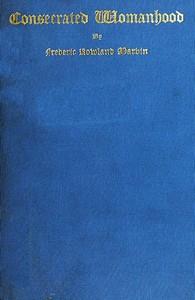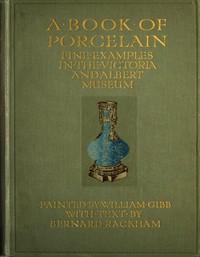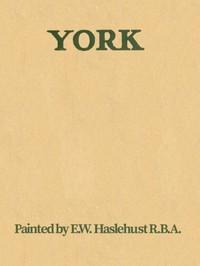Read this ebook for free! No credit card needed, absolutely nothing to pay.
Words: 29906 in 8 pages
This is an ebook sharing website. You can read the uploaded ebooks for free here. No credit cards needed, nothing to pay. If you want to own a digital copy of the ebook, or want to read offline with your favorite ebook-reader, then you can choose to buy and download the ebook.
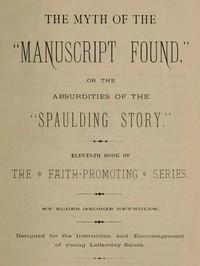

: The Myth of the Manuscript Found or the Absurdities of the Spaulding Story Eleventh Book of the Faith-promoting Series. Designed for the Instruction and Encouragement of Young Latter-day Saints. by Reynolds George Adapter - Book of Mormon Latter Day Saint
This being the case, how is it possible for the two works to be identical?
But admitting, for the sake of argument, that Joseph Smith might have changed the statement of the author of the "Manuscript Found" in this one particular, we will proceed to show that such a supposition is utterly impossible; for to have retained the unities of the work and the consistencies of the story , he must have altered not only the leading features but also the minor details of the whole historical narrative. He must have altered the place of departure, the circumstances of the journey, the route taken by the emigrants, the time of the emigration and every other particular connected with such a great movement. We must recollect that the Book of Mormon gives the account of a small colony being led by the Lord from the city of Jerusalem through the wilderness south and east of that city, to the borders of the Red Sea, thence for some distance in the same direction near its coast, and then across the Arabian peninsula to the sea eastward. What insanity could have induced Mr. Spaulding to propose such a route for the ten tribes? For of all out-of-the-way methods of reaching the American continent from Media, this would be one of the most inaccessible, difficult, round-about and improbable, and would carry them along the two sides of an acute angle by the time they reached the shore where the ship was built. It would almost certainly have taken these tribes close to, if not through a portion of their own ancient homes, where it is reasonable to suppose nearly all would have desired to tarry, when we consider how great was the love that ancient Israel bore for that rich land given to them by divine power.
Mr. Spaulding, as a student of the Bible, would have made no such blunder. But even supposing that he was foolish enough in his romance to transport the hosts of Israel from the south-western borders of the Caspian Sea by the nearest route, most probably over the Armenian mountains, across the Syrian desert, and by way of Damascus through the lands of Gilead, Moab and Edom into the wilderness of the Red Sea, where, we ask, is there an account of such a journey in any portion of the Book of Mormon? There is none, for the Book of Mormon opens with the description of Lehi's departure from Jerusalem, with the causes that led thereto, he having been a resident of that city all his days, and never a captive in Media. Therefore we are justified in asking, at the very outset of this inquiry, where, from the opening pages onward, is there any identity between the two books?
Then, again, is it not obvious to every thinking person that the moving of a nation, such as the ten tribes were, must have had associated with it events and circumstances entirely inconsistent and at variance with the simple story of the journey of Lehi and his family as given, frequently with minute detail, in the Book of Mormon? How numerous were the host of the captive Israelites we have no means of definitely ascertaining. We learn, however, that in one invasion alone, Shalmaneser, king of Assyria, carried off two hundred thousand captives from the kingdom of Israel. Even admitting that in their captivity these two hundred thousand did not increase in numbers, and entirely ignoring all the other thousands that were led away captives in other invasions, we should necessarily expect that Spaulding, in his account of the moving of this mass of humanity--men, women and children, with their flocks, herds and supplies--would write a narrative consistent with the subject and not one such as the Book of Mormon contains. But whether he did or did not, the Book of Mormon contains nothing whatever of the kind. In that work no vast armies are led out of Media by any route whatever to the American continent.
We have there an entirely different story, more dissimilar indeed from Spaulding's supposed narrative than the history of the deliverance of Israel out of Egypt, under Moses, is from the story of the departure from the old world, the voyage across the Atlantic and the landing on this continent of the Pilgrim Fathers, of revered memory. In the narrative that the Book of Mormon gives of the journeyings of Lehi and his little colony, all the incidents related are consistent with the idea of a small people and entirely inconsistent with that of a vast moving multitude.
For instance, let us take as an example, the story of Nephi breaking his bow by which the little caravan was placed in danger of starvation. If there had been a vast host, numbering nearly a quarter of a million souls, such an incident could have had no weight; for surely Mr. Spaulding never wrote that one hunter alone supplied such a multitude with all the necessary food, and it would be equally absurd to imagine that that gentleman would tell such an improbable story as that all the hunters broke all their bows at the same time. Again, the Book of Mormon tells us that Lehi and his companions depended on the chase for their entire food. Where, we would ask, in the midst of the Arabian desert, could game enough be found to supply the entire wants of the migrating ten tribes? And further, what would they do for water for such a company in the trackless Arabian desert without divine interposition and the manifestation of miraculous power? But the Book of Mormon hints at no such contingency.
We must now draw attention to the time when the Book of Mormon states Lehi and his company were led out of Jerusalem. There is no ambiguity on this point. It is repeatedly stated that this event took place six hundred years before the advent of our Savior; that is, it was previous to the Babylonish captivity. The ten tribes were not lost sight of at that time; they were undoubtedly still in the land of their captivity, and if Mr. Spaulding was foolish enough in his romance to set a date to his exodus, he certainly would not have placed it during the lifetime of Jeremiah, the prophet, and of Nebuchadnezzar, king of Babylon; for not only would such a date have marred the consistency of the story, but it is also utterly impossible for us to conceive, as an historical probability, that the mighty king of Babylon would have permitted the ten tribes to escape from their captivity at that time, and above all things to have taken such a route as would have brought them near the borders of the Red Sea. If they escaped at all, it necessarily would have been to the uninhabited regions northward. From a political standpoint it would have been suicidal and utterly inconsistent with the polity of the king of Babylon to allow the captive Israelites to march forth in the supposed direction; for it would have placed them in immediate contact with the kingdom of Judah and enabled them to have formed an alliance with their former brethren antagonistic to his interest and policy.
To pursue the subject still further: when the colony reached the land of promise, which we call America, the incidents related in the Book of Mormon are entirely consistent with the story of the voyage and of the peopling of the land by a small colony and not by a vast host. If Joseph Smith, as some claim, had changed Mr. Spaulding's romance, he must have still continued to alter the narrative throughout the entire volume, for the story still maintains its consistency, and through it from beginning to end there runs a thread, possible only on the theory that it was a single family with their immediate connections through marriage that first founded the nations of the Nephites and Lamanites. The entire history hinges on the quarrels of the sons of Lehi and the results growing therefrom; for from the division of this family into two separate and distinct peoples grew all the wars, contentions, bloodshed, troubles and disasters that fill the pages of this sacred record; while on the other hand, the blessings flowing to both nations almost always resulted from the reconciliation of the two opposing peoples and the inauguration of a united and amicable policy beneficial alike to both. Had the American continent been peopled at the commencement by a vast host, the whole current of the story must have been vastly different, not only in the events that took place, but also in the motives that controlled the hearts of the actors who took part in those events, and in the traditions of the masses. In the case of the Nephites and Lamanites, these traditions had an overwhelming influence in the shaping of public affairs, which shape they never could have received by any set of traditions incidental to Mr. Spaulding's story.
What, too, shall we say of the Jaredites? From whence did Joseph Smith beg, borrow or steal their history? Did Mr. Spaulding bring his ten tribes from the tower of Babel, and give them an existence ages anterior to the lifetime of their great progenitor, Jacob? If not, will somebody inform us how this portion of the Book of Mormon was manufactured?
From the above it is evident that if Mr. Spaulding's story was what its friends claim, then it never could have formed the ground work of the Book of Mormon, for the whole historical narrative is different from beginning to end. And further, the story that certain old inhabitants of New Salem, who, it is said, recognized the Book of Mormon, either never made such a statement, or they let their imagination run away with their memory into the endorsement of a falsehood and an impossibility. Either way there is a lie; if they asserted that the Book of Mormon is identical with the "Spaulding story," then they are guilty of having violated the truth; if they did not make this statement, then the falsehood is with those who, in their hatred to modern revelation, have invented their testimony. The same statement applies to those who assert that the Book of Mormon was copied almost word for word from the "Manuscript Found." A book that is entirely dissimilar in its narrative cannot be exact in its wording. As well might we say, and be just as consistent and every way as truthful, that the history of England was copied from the adventures of Robinson Crusoe. So it is with the Book of Mormon and the Spaulding romance.
If then the resemblance is so small between the Book of Mormon and the "Manuscript Found," when we consider the ten tribe version of the latter work, where is it possible there can be the shadow of similarity when we examine the Roman colony theory? For instance:
Lehi left Jerusalem; Spaulding's heroes sailed from Rome.
Free books android app tbrJar TBR JAR Read Free books online gutenberg
More posts by @FreeBooks
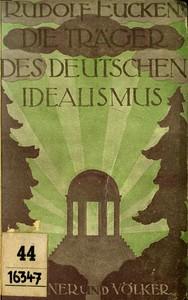

: Consecrated Womanhood A Sermon Preached in the First Congregational Church Portland Oregon by Marvin Frederic Rowland Cobbe Frances Power Author Of Introduction Etc - Sermons American; Women in the Bible; Women Biblical teaching
